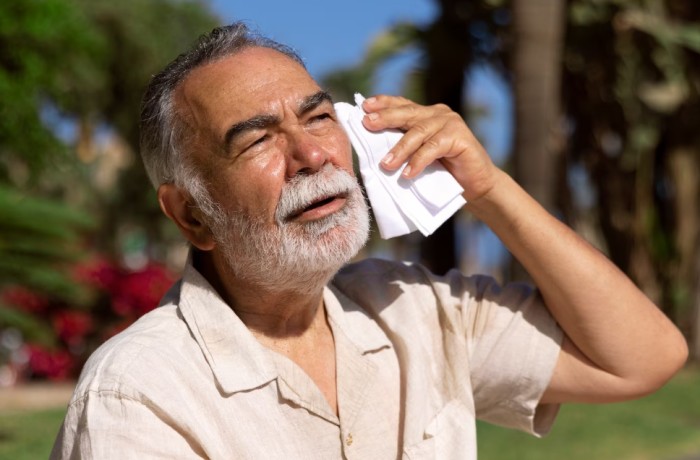IMANA NEWS
Common Summer Illnesses and How To Avoid Them
07 August 2023

Longer days, blue skies, warm breezes, swimming in the sea, barbecues and ice cream, summer drinks, lazy days under the sun….. Summer brings it all back and then some.
The warm pleasant weather encourages us to go outside and dream of holidays but as with everything, the good comes with the bad.
Summer brings insanely high temperatures. Since bacteria thrive and multiply in hotter environments, it can put your health at risk in more ways than one. We’ll shed light on common summer illnesses—who are more prone to them, how to avoid them, and tips on how to stay healthy in summer.
1. Dehydration
Hot temperatures could cause you to lose more water than you take in. This depletes the water levels in your body, severely impacting how your body functions. While common, it is especially dangerous for young people and the elderly. It’s worth noting that the water in our body decreases with age while some pills can increase the risk of dehydration.
When you’re dehydrated, you feel thirsty all the time, experience fatigue, have dry mouth and tongue, dizziness, confusion, headaches, and urinate less frequently.
Because dehydration can cause morbidity and mortality, it’s important to review your hydration habits to keep your body healthy. Here’s how:
- Drink at least 2.5 liters of water gradually throughout the day.
- Replenish fluids and electrolytes when you sweat.
- Incorporate food with high water content in your diet.
- Invest in a water bottle that infuses your water with flavor.
- Avoid alcohol, high-sugar drinks, and caffeine.
It also helps to wear light, loose-fitted clothes (preferably made of cotton and other breathable fabrics) and protect yourself with hats.
2. Food Poisoning
Hosting a barbecue this summer? There’s something you need to know.
Summer provides the ideal conditions for bacteria like salmonella and E. coli to breed and multiply. If we become infected, they can lead to symptoms of summer illnesses, including nausea, vomiting, diarrhea, lack of energy, fever, and stomach cramps.
That’s why you need to be extra cautious around food, especially if you have kids under 5, senior adults, and those with compromised immune systems in your family.
To avoid food poisoning:
- Use a meat thermometer to ensure that food (raw meat, poultry, seafood, and eggs) is cooked at temperatures high enough to kill bacteria.
- Avoid street food. It may taste good but can be unhygienic.
- Clean your counters, utensils, and work surfaces before and after cooking.
It also helps to separate your meats and veggies, wash your hands before handling anything, and use separate chopping boards for prepping ingredients.
Note that water-borne diseases are common in summer, so be sure to treat water before drinking and diligently employ hygienic measures.
3. Hay Fever
Summer hay fever, or seasonal allergic rhinitis, is caused by blooming plants like ragweed. It’s an allergic reaction to pollen that can manifest in frequent sneezing, a congested nose, itchy throat, and watery eyes—similar to cold symptoms.
Considering that it can affect your quality of life during some of the most enjoyable months of the year, it’s important to be proactive in avoiding hay fever.
That means wearing a mask and wraparound sunglasses to avoid exposure to pollen and stocking up on antihistamines if you have a family history of allergies.
4. Sunburn
Lounging in the sun all day may give your skin a bit of color, but prolonged exposure to sunlight can actually cause harmful sunburns. Burns can cause pain, redness, rashes, inflammation, premature aging, and, worst of all, skin cancer.
According to the Skin Cancer Foundation, having 5 or more sunburns doubles your risk for melanoma—a type of skin cancer that takes the life of nearly 20 Americans daily.
Since it isn’t immediately evident, there’s a risk of delayed treatment. That’s why you need to do damage control so it doesn’t occur in the first place. How?
- Wear broad-spectrum sunscreen on exposed parts of your body. Reapply every 2 hours, especially if you’re going swimming or sweat a lot.
- Use accessories that will shield you from the sun such as sunglasses, wide-brimmed hats, and so on.
- Wear sun-protective clothing to shield your skin from the sun’s rays.
And try to stay indoors when the sun is at its highest so you avoid peak UV hours.
5. Sun Stroke
Prolonged exposure to the sun can cause your body’s thermoregulation systems to fail. When the weather is exceptionally hot (temperatures of at least 104 degrees Fahrenheit or 40 degrees Celsius), it can increase your risk of heatstroke.
While it can affect everyone, infants and the elderly are more susceptible to it.
It’s a very dangerous condition that often requires immediate medical intervention. If ignored, it can lead to multiple organ failures which may cause coma or death.
For timely treatment, you must keep an eye out for tell-tale signs, which include:
- Weakness
- Hot, flushed skin
- Nausea and vomiting
- Dizziness
- Seizures
- Delirium
- Low urine output
- Elevated heart rate
To lower your risk of heat exhaustion, drink plenty of nonalcoholic fluids, avoid extreme exercises when outdoors, and limit your exposure to the sun.
Take Home Message
When you think about these summer illnesses, it may seem like you can’t enjoy summer at all, but that isn’t true. By taking some precautions, such as hydrating adequately, eating right, wearing protective clothing, and slathering sunscreen, you can lower your risk of developing these diseases while celebrating the season.
If you have older family members, check out our list of engaging summer activities for seniors. With our tips and some planning, you might just enjoy your best summer yet.